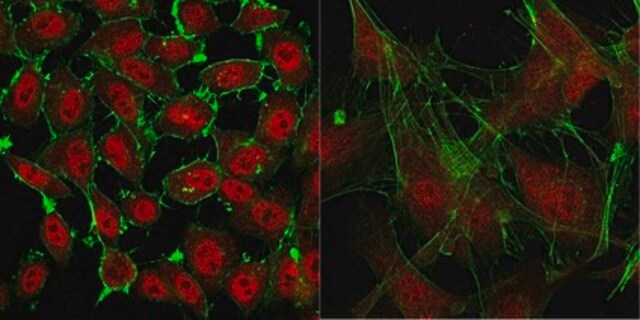SAB5500001
Anti-beta-Actin antibody, Rabbit monoclonal
clone SP124, recombinant, expressed in proprietary host, affinity isolated antibody
About This Item
Produtos recomendados
fonte biológica
rabbit
Nível de qualidade
recombinante
expressed in proprietary host
conjugado
unconjugated
forma do anticorpo
affinity isolated antibody
tipo de produto de anticorpo
primary antibodies
clone
SP124, monoclonal
reatividade de espécies
human (tested)
reatividade da espécie (prevista por homologia)
chicken, mouse, rat, bovine, rabbit, pig, dog, hamster, frog
técnica(s)
flow cytometry: 1:100
immunoblotting: 1:200
immunohistochemistry: 1:200
Isotipo
IgG
nº de adesão UniProt
Condições de expedição
wet ice
temperatura de armazenamento
2-8°C
modificação pós-traducional do alvo
unmodified
Informações sobre genes
human ... ACTB(60)
Categorias relacionadas
Descrição geral
Imunogênio
Aplicação
Ações bioquímicas/fisiológicas
Características e benefícios
forma física
Exoneração de responsabilidade
Not finding the right product?
Try our Ferramenta de seleção de produtos.
Código de classe de armazenamento
12 - Non Combustible Liquids
Classe de risco de água (WGK)
WGK 2
Ponto de fulgor (°F)
Not applicable
Ponto de fulgor (°C)
Not applicable
Certificados de análise (COA)
Busque Certificados de análise (COA) digitando o Número do Lote do produto. Os números de lote e remessa podem ser encontrados no rótulo de um produto após a palavra “Lot” ou “Batch”.
Já possui este produto?
Encontre a documentação dos produtos que você adquiriu recentemente na biblioteca de documentos.
Os clientes também visualizaram
Nossa equipe de cientistas tem experiência em todas as áreas de pesquisa, incluindo Life Sciences, ciência de materiais, síntese química, cromatografia, química analítica e muitas outras.
Entre em contato com a assistência técnica












